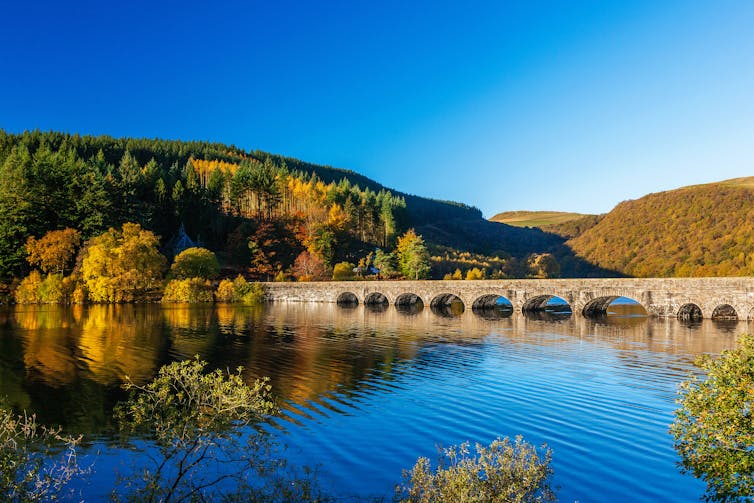
The privatisation of water companies in England and Wales was supposed to bring efficiency and investment to a vital sector that had been starved of public funding. But since 1989, the industry has failed to invest sufficiently in replacing antiquated pipes and sewage treatment systems.
Rivers and seas have become increasingly polluted with raw sewage. Meanwhile, dividend payments, funded by water companies loading up on corporate debt, have soared.
The largest of those companies, Thames Water, has debts of almost £14 billion – roughly 80% of the value of the assets of the business. Rising inflation and interest rates mean this debt is increasingly expensive to service, let alone reduce.
If Thames Water collapses, the UK government is likely to step in and manage the company through a special form of business administration to ensure 15 million customers continue to receive their water and sewerage services. But state involvement would probably be temporary, with the aim of an eventual return to the private sector.
Many would see this as a missed opportunity to do things differently. There are already groups calling for Thames Water to be renationalised and brought into public ownership to remove the company’s profit motive and the pressure of paying dividends to shareholders. Instead, the theory goes that, as a local natural monopoly, Thames Water ought to be run as a publicly owned utility fully focused on providing a public service.
But doing this would be far from straightforward. To begin with, it would involve the transfer of corporate debt onto the government’s own balance sheet, which could dramatically constrain spending on other public services, such as the NHS and education.
Another complication comes from the fact that an administration process usually involves attempts to raise funds from the sale of company assets to pay off debts. But in the case of a water company, those assets are part of an integrated and complex infrastructure. It would not be practical to break up those assets if any new company was to go on providing water and sewage services to the public.
Renationalising Thames Water would therefore require the government to buy the assets. But the cost of doing so could be enormous, and the current shareholders would need to be adequately compensated. These include investors like pension funds, which the government would find politically hard to ignore.
And even though governments can generally borrow more cheaply than private sector companies (or even deal with its own debts by printing money), these options are not attractive. They could be inflationary, and would risk a negative response from the financial markets. Renationalistation could end up being seen as an expensive acquisition that brings no new money to improve the water industry.
An alternative would be to sell the assets to a new private company or investor. But existing water companies are unlikely to be considered suitable buyers on competition grounds (and many already face similar problems as Thames Water). Demands for significant future investment to meet tighter environmental standards are also likely to deter other investors.
A more attractive option might be to create a new kind of water provider – a bit like an unusual one that already exists in Wales.
Not for profit
Welsh Water has a unique corporate structure, with no shareholders and is run solely for the benefit of its customers. It is commercially run, with professional managers held to account by 62 independent trustees. While not perfect, its performance in recent years compares favourably with that of the other privatised water companies.

Welsh Water’s decisions are made not in the interest of profit-seeking shareholders but in the interests of broader society. Any profits made are either reinvested or returned to its 3 million customers in the form of cheaper services.
Creating such an organisation would not be easy. But there is a precedent in the case of Network Rail, a similar trustee-governed organisation, which was created when its commercial predecessor Railtrack went bust. Railtrack’s debts were subsumed into Network Rail, which were underwritten by the government (while initially staying off the public sector balance sheet). This change in ownership structure led to significant improvements on Railtrack’s atrocious safety record and reduced the cost of rail operations too.
A move towards the Welsh Water model would be in line with recent calls to turn all water firms into democratically run companies focused on public benefit. If renationalisation is considered to be too tricky politically and not viable economically, other solutions are available.
And while it is true that these public-interest companies are funded by debt, a government debt guarantee helps keep the costs of servicing this debt down (while costing the government very little). By not renationalising, the UK economy would avoid many considerable challenges – and a hefty water bill.
J. Robert Branston has received funding from Bloomberg Philanthropies and several other health related charitable organisations. He is a non-active member of the Liberal Democrats.
Phil Tomlinson receives funding from the Engineering and Physical Sciences Research Council (EPSRC) for Made Smarter Innovation: Centre for People-Led Digitalisation, and the Economic and Social Research Council (ESRC) for an Interact project on UK co-working spaces and manufacturing.
This article was originally published on The Conversation. Read the original article.







